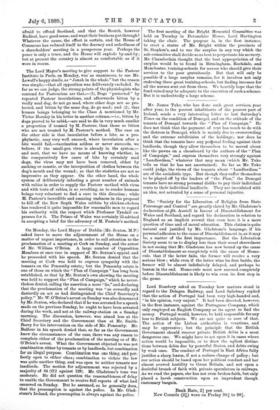On Monday, the Lord Mayor of Dublin (Mr. Sexton, M.P.)
asked leave to move the adjournment of the House on a matter of urgent importance„ in order to call attention to the- proclamation of a meeting at Cork on Sunday, and the arrest of Mr. William O'Brien. A large number of Opposition Members at once rose in support of Mr. Sexton's appeal, and he proceeded with his speech. Mr. Sexton denied that the meeting at Cork was held to express sympathy with the tenants on the Ponsonby estate; but the Ponsonby estate is one of those on which the " Plan of Campaign" has long been established, so that by Mr. Sexton's own showing the meeting was held to support the "Plan of Campaign," which he never- theless denied, calling the assertion a mere "lie," and declaring that the proclamation of the meeting was "as cowardly and dastardly an act as had distinguished the Chief Secretary's policy." Mr. W. O'Brien's arrest on Sunday was also denounced by Mr. Sexton, who declared that if he was arrested for a speech made on the previous Sunday, he ought to have been, arrested during the week, and not at the railway-station on a Sunday morning. The discussion, however, was aimed less at the Chief Secretary and the Government than at Mr. Smith- Barry for his intervention on the side of Mr. Ponsonby. Mr. Balfour in his speech denied that, so far as the Government knew the circumstances of the case, there was any reason to complain either of the proclamation of the meeting or of Mr. O'Brien's arrest. What the Government objected to was not combination either by tenants or by landlords, but combination for an illegal purpose. Combination was one thing, and per- fectly open to either class; combination to violate the law was quite another thing, and was open to neither tenants nor landlords. The motion for adjournment was rejected by a majority of 84 (212 against 128). Mr. Gladstone's tone was moderate. He did not question the reasonableness of delay to enable the Government to receive full reports of what had occurred on Sunday. But he assumed, as he generally does, that the presumption is against the police. In Mr. Glad- stone's Ireland, the presumption is always against the police.










































 Previous page
Previous page